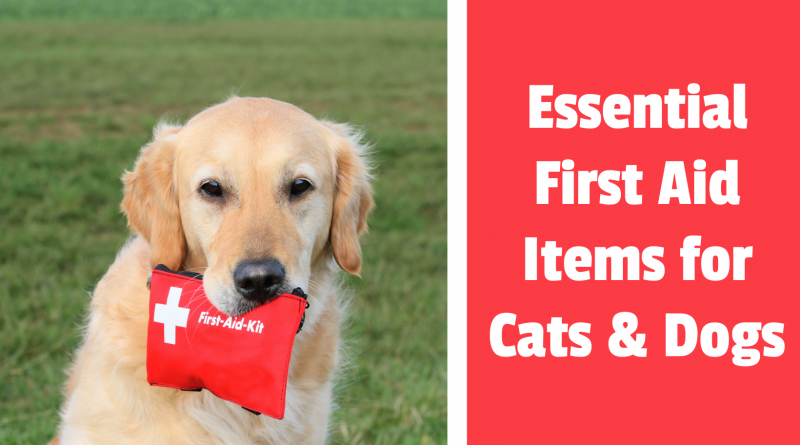Essential First Aid Items for Cats and Dogs
Many people have first aid kits for humans but what about one for your four-legged family members? Everyone has an injury at some point or another and that includes pets too! April is National Pet First Aid Awareness Month and is a great time to get prepared. Here are some important items to have in your pet first aid kit:
- Gauze, Non-Stick Bandages & Tape: These are great for wrapping and protecting wounds and to control any bleeding.
- Digital Thermometer: To check if your pet has a fever or low temperature. A normal temperature range for dogs is between 101 to 102.5 degrees and between 100.4 to 102.5 degrees for cats.
- Disposable Gloves: These should be worn when cleaning and bandaging wounds to limit the risk of infection.
- Cotton Balls & Swabs: Use to apply ointments and to clean out small cuts.
- Tick Removal Tool: If your pet has been bitten by a tick it’s a good idea to save it in a sealable plastic bag so it can be tested for Lime Disease or other tick-borne illnesses.
- Nail Clippers: Long nails on cats and dogs can be dangerous for them and the people helping them. Keeping nails short will help keep them from causing damage to any wounds.
- Tweezers & Scissors: Important tools for cutting tape or pulling out splinters.
- Antiseptic Ointment or Wipes: Antiseptic ointment or wipes can be used on cats and dogs when they have a cut or scrape and will not cause stinging when applied.
- Saline Solution: This is great to flush out wounds or eyes to clean them of any dirt or debris.
- Milk of Magnesia or Activated Charcoal: These can be administered to cause vomiting if your pet has gotten into anything dangerous or poisonous. Do not administer before speaking to your veterinarian or poison control.
- Eye Dropper or Syringe: Can be used to flush out wounds or eyes, and to administer medicine.
- Ice Pack: An emergency ice pack can be used to help reduce bruising and swelling.
- Blanket: This can be used to help keep pet warm or help keep your pet restricted in an emergency.
- Diphenhydramine (e.g., Benadryl): An important pill to have on hand for allergic reactions, bug bites, snake bites, and bee stings. It’s recommended to give 1 pm per pound for cats and dogs. Always check with your veterinarian before administering.
- Cone or Inflatable Collar: This will prevent your pet from licking any wounds which could lead to infection.
- Muzzle: Only use a muzzle on a dog if they are not vomiting. A muzzle will prevent them from biting anyone who is trying to help them.
- Emergency Contacts & Medical Records: This should include phone numbers for your veterinarian, closest emergency veterinary clinic, Animal Poison Control Center (888-426-4435), and an up-to-date list of medications, vaccine records, and any allergies your pet has. This is great to have if your pet is being watched by a sitter, so they have all your pet’s information handy in case of an emergency.
No one wants to think about pet emergencies but it’s better to be safe than sorry. Next time you go on a trip, camping, or have a pet sitter be sure to have your pet first aid kit handy. Your pets will thank you for it!
Follow us on Instagram or Facebook for more pet safety and health tips!

